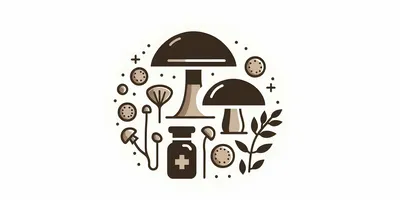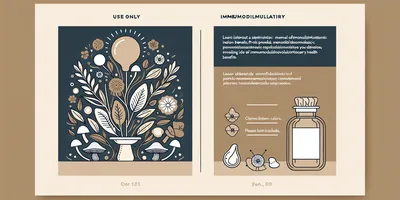Parasol Mushroom Benefits (Macrolepiota procera)
Parasol Mushroom (Macrolepiota procera) is an edible mushroom and medicinal mushroom.

Supports Mental Well-being
The Parasol Mushroom has been increasingly recognized for its potential benefits in mental health, notably its antidepressant properties. A comprehensive review of the chemical composition and biological properties of the mushroom illustrated its potential as an antidepressant, among other health benefits. The study summarizes several years of research and highlights its promising role in supporting mental well-being.
The antidepressant effect of the Parasol Mushroom is attributed to its rich chemical makeup, which includes a variety of compounds that have been associated with mood regulation. As part of a broader analysis of its health-promoting attributes, this mushroom is seen as a potential natural solution to improve mental health.
Moreover, the research underscores the importance of quality control in the commercial cultivation of Parasol Mushrooms, which impacts their chemical composition and, consequently, their effectiveness in medicinal applications. The recognition of Parasol Mushroom’s holistic benefits paves the way for further research and potential therapeutic use in the realm of mental health.
Learn about mushrooms with antidepressant benefits.

Supports Anti-Inflammatory Response
Chronic inflammation can lead to a variety of health issues, but incorporating Parasol Mushroom into one's diet may offer a natural counteractive approach. The bioactive compounds found in this mushroom have been noted for their anti-inflammatory properties. This suggests potential benefits for reducing the risk of diseases where inflammation is a contributing factor.
A significant review examining the Parasol Mushroom’s influence on health discovered that aside from its rich flavor and aromatic appeal, it harnesses natural compounds that serve as antioxidants and anti-inflammatory agents. Specifically, the study shows that it contains several elements which may help modulate the body's inflammatory response, providing a promising avenue for both therapeutic and nutritional applications. Moreover, understanding the influence of processing methods on these benefits is crucial, as it allows for the optimization of its anti-inflammatory potential when consumed.
In light of this research, Parasol Mushroom emerges as a valuable addition to the realm of prohealth foods. The investigation into its antioxidant and anti-inflammatory effects not only underscores its culinary versatility but also its significance as a functional food with possible medicinal applications.
Learn about mushrooms with anti-inflammatory benefits.

Antioxidant Benefits
The Parasol Mushroom is not just a delicious addition to culinary dishes; it also boasts significant health-promoting properties, particularly its antioxidant benefits. Antioxidants are crucial in combating oxidative stress caused by free radicals, which are unstable molecules that can damage cells, leading to aging and various diseases.
A study on the Agrimonia procera herb's extract has shown remarkable antioxidative effects. It scavenges harmful radicals and reduces the accumulation of reactive oxygen species (ROS), culminating in the protection against oxidative stress. These antioxidant properties are also linked to enhanced longevity and improved stress resistance, mediated by the transcription factor DAF-16—an orthologue of mammalian FoxO proteins involved in metabolic disease and diabetes regulation.
Moreover, research on the water-extractable polysaccharides (WEPS) from the Parasol Mushroom has revealed not only their complex structural composition but also mild antioxidant activity. These polysaccharides, primarily composed of glycogen and β-D-glucans, can have a mild impact on reducing oxidative stress in the body.
Further reinforcing these benefits, a comprehensive analysis of the Parasol Mushroom lauds its antioxidant properties among other health-promoting effects. The paper emphasizes the mushroom's potential in mitigating oxidative damage while indicating the prospects of incorporating the mushroom into health-oriented food products and medicinal applications.
It's evident that the Parasol Mushroom's antioxidative potential is a valuable asset alongside its gastronomic appeal, contributing to a healthier and more resilient body capable of withstanding the challenges of oxidative stress.
Learn about mushrooms with antioxidant benefits.

Anticancer Benefits
The Parasol Mushroom is not only a choice edible species but also boasts significant health-promoting properties. Among its most researched benefits is its potential to combat cancer. Recent studies have delved into the bioactive compounds present in Parasol Mushroom that may contribute to its anticancer properties.
A comprehensive review of the chemical composition and health benefits of the Parasol Mushroom, including its anticancer effects, has highlighted that the compounds found within the mushroom may have the ability to inhibit the growth of cancer cells. This review, titled "Possibilities of Using Macrolepiota procera in the Production of Prohealth Food and in Medicine," emphasizes the mushroom's bioactive components such as antioxidants and polysaccharides which are thought to play a role in hindering cancer progression. These findings open up opportunities for the Parasol Mushroom to be incorporated into functional foods and therapeutic applications that aim to reduce the risk of cancer or support ongoing cancer treatments.
Inclusion of Parasol Mushroom in one's diet could potentially offer a natural and complementary approach to cancer prevention and control. As embraced by modern research, there is a growing interest in how mushrooms such as the Parasol can influence health outcomes, especially concerning chronic diseases like cancer. By gaining a deeper understanding of the mushroom's constituents through studies like the aforementioned review, we move closer to harnessing its full potential in the realm of medicinal foods.
For a more in-depth exploration of these findings, interested readers can access the full review here.
Learn about mushrooms with anticancer benefits.

Immunomodulatory Benefits of Parasol Mushroom
The parasol mushroom exhibits impressive immunomodulatory effects, particularly through the actions of water-extractable polysaccharides (WEPS) found within the mushroom. Research has identified a complex polysaccharide, MP-PSC, extracted from the parasol mushroom containing significant amounts of immune-stimulating compounds such as glycogen and β-D-glucans. These components play a crucial role in modulating the body's immune response.
A fascinating aspect of MP-PSC is its ability to influence various immune cells. The study suggests that MP-PSC can increase the number of CD14+ monocytes, a type of white blood cell essential for the immune system's frontline defense. Moreover, engagement with immune cells such as murine macrophages led to an increase in the production of nitric oxide (NO) and the proinflammatory cytokine IL-6, signaling the activation of the body's natural defense mechanisms.
Interestingly, while MP-PSC activates certain elements of the immune response, it has not shown direct anti-inflammatory effects. This suggests its role might be more supportive in nature, enhancing immune function without actively suppressing inflammation. In addition to its immunomodulatory actions, MP-PSC exhibited mild antioxidant capabilities and inhibited the growth of several pathogenic bacteria. These properties highlight the potential of parasol mushroom polysaccharides to be included in synbiotic foods designed to promote gastrointestinal health and support the immune system.
However, it is important to note that the immunomodulatory effects observed may be influenced by the presence of lipopolysaccharides (LPS) within the extracts. Continued research is necessary to further investigate these effects and the potential application of parasol mushroom extracts in health and dietary supplements.
Learn about mushrooms with immunomodulatory benefits.

Antibacterial Benefits
The Parasol Mushroom has shown promise in the field of antibacterial application. Research has identified water-extractable polysaccharides from the mushroom that exhibit significant antibacterial properties, suggesting its potential for therapeutic uses. These polysaccharides have been shown to inhibit the growth of several pathogenic bacteria, which might open doors for new synbiotic foods aimed at enhancing gut health and supporting the immune system.
Further analysis of the mushroom’s components has revealed a range of health benefits, including its antimicrobial activities. The antibacterial effects are a part of the mushroom's broader impact on health, demonstrating its potential for use in the production of pro-health food products as well as in medicinal applications. The versatility of the Parasol Mushroom is especially significant given the increasing demand for natural and effective antibacterial agents.
Moreover, the comprehensive studies underscore the importance of extracting these beneficial compounds without diminishing their efficacy. Therefore, the possibility of incorporating Parasol Mushroom's antibacterial substances in both daily diet and medical treatment highlights its valuable contribution to promoting health and combating bacterial infections.
Learn about mushrooms with antibacterial benefits.

Rich in Antioxidants
The Parasol Mushroom is not just a delicacy but also a considerable source of antioxidants which are essential for maintaining good health. Antioxidants help in neutralizing harmful free radicals that are a byproduct of cell metabolism and are associated with aging and various diseases.
Recent research has delved into the potential of nanoparticles to enhance the antioxidant properties of medicinal plants. In a fascinating study, scientists used biogenic silver nanoparticles (AgNPs) to augment the production of bioactive compounds in Juniperus procera, a medicinal plant. The results were clear: higher concentrations of AgNPs substantially improved the plant's antioxidant defenses, both enzymatic and non-enzymatic, as well as increased the production of vital bioactive compounds like phenols and flavonoids, which are known for their antioxidant activity.
This innovative approach to boosting the antioxidative profile of plants through the use of AgNPs points to broader implications for the enhancement of health-promoting properties in mushrooms such as the Parasol Mushroom. The study's insights Biogenic silver nanoparticles improve bioactive compounds in medicinal plant Juniperus procera may lead to new techniques to increase the antioxidant levels in these fungi, giving us more ways to harness their beneficial properties.
As the research community continues to explore these avenues, the role of antioxidant-rich foods like the Parasol Mushroom in a balanced diet becomes even more valuable in the quest for health and longevity.
Learn about mushrooms with antioxidants benefits.

Richness in Phytochemicals
The Parasol Mushroom is a source of a variety of phytochemicals that are beneficial to human health. Phytochemicals are plant-derived compounds known for their antioxidant, anti-inflammatory, and immune-supportive properties. In particular, this mushroom contains phenolic compounds, which are bioactive constituents that play a major role in promoting health and preventing diseases.
Recent research has acknowledged the significance of phytochemicals in the Parasol Mushroom. A study investigating the role of biogenic silver nanoparticles (AgNPs) on medicinal plants found that AgNPs significantly enhanced the production of key bioactive compounds in Juniperus procera. Diverse analytical techniques confirmed the characterisation of the AgNPs, which facilitated the increase in enzymatic and non-enzymatic antioxidants, as well as the overall biomass accumulation of medicinal plants.
Moreover, the application of AgNPs in the study showcased a remarkable increase in valuable phytochemicals such as phenols, tannins, flavonoids, and other compounds that are essential for maintaining good health. Such findings suggest that similar elicitation methods could reveal more about the phytochemical potential of the Parasol Mushroom, thereby paving the way for new applications in nutraceuticals and functional foods. The implications of this research on the enhancement of bioactive compounds in medicinal plants are highly promising for the future of natural health products.
For a deeper understanding of how these nanoparticles can foster phytochemical enrichment, read the full study "Biogenic silver nanoparticles improve bioactive compounds in medicinal plant Juniperus procera in vitro."
Learn about mushrooms with Phytochemicals benefits.

Rich in Essential Minerals
The Parasol Mushroom is not only a gourmet delight but also a significant source of dietary minerals essential for human health. Research into the mineral content of wild mushrooms has revealed interesting insights into their nutritional value. A study analyzing the mineral composition of several mushroom species found that wild-growing mushrooms, including the Parasol Mushroom, can be rich in essential major minerals—such as calcium and phosphorus—as well as critical trace elements like iron and boron.
These findings highlight the potential of including Parasol Mushroom in the diet as a natural way to supplement essential minerals. Calcium is pivotal for bone health, phosphorus plays a critical role in energy transfer and genetic material synthesis, iron is crucial for oxygen transport, and boron is involved in bone growth and maintenance. Discovering the specific mineral profiles of these mushrooms not only allows us to appraise their nutritional benefits but also serves to inform safe consumption practices, given the presence of certain potentially harmful elements in some species.
Furthermore, this research underscores that the mineral accumulation in mushrooms like the Parasol Mushroom is more dependent on the species rather than the broader family classification to which they belong. This species-specific propensity for mineral enrichment underlines the importance of individual mushroom types in contributing to a mineral-rich diet. The study's application of advanced analytical methods provides a deeper understanding of the intricate relationship between mushroom species and their mineral content, encouraging the exploration of these natural resources as beneficial dietary components.
Learn about mushrooms with mineral-rich benefits.

Nutritional Diversity in the Parasol Mushroom
The Parasol Mushroom is not only popular as a gourmet choice but also boasts a diverse array of nutrients that are essential to human health. Research has delved into the mineral composition of various mushroom species, highlighting their nutritional value and role in a balanced diet. An insightful study conducted in Poland evaluated the mineral content in 17 wild-growing mushroom species, including an examination of both beneficial elements and those that could be potentially harmful when consumed in large quantities.
One of the key findings was the presence of important major elements such as calcium and phosphorus, as well as vital trace elements like iron and boron. These elements play crucial roles in bone health, metabolic processes, oxygen transport in the blood, and cell growth and differentiation. The study further determined that the mineral accumulation in mushrooms could vary significantly based on the species rather than the family. This is particularly interesting for the Parasol Mushroom, emphasizing the importance of species-specific studies when evaluating the nutritional benefits of mushrooms. By understanding which mushrooms contain higher levels of essential minerals, consumers can make informed dietary choices.
While the research did acknowledge the accumulation of some elements that could be harmful in large amounts, such as thallium and barium, it is important to note that the consumption of wild mushrooms should be approached with knowledge and caution. Proper identification and understanding of local edible mushroom species are essential to ensure safety. That said, the Parasol Mushroom can be a healthy addition to the diet when properly sourced and prepared, contributing to mineral diversity and nutritional balance. For those interested in the mineral compositions of wild mushrooms and their implications for dietary considerations, the full study offers comprehensive insights. Read the full research here.
Learn about mushrooms with nutrient diversity benefits.

Supports Longevity and Stress Resistance
The Parasol Mushroom may contribute to a longer lifespan and increased resistance to stress, according to recent studies. A remarkable study involving the model organism Caenorhabditis elegans has shown promising results where an ethanol extract of the mushroom demonstrated potent antioxidative attributes. This includes the scavenging of harmful radicals and reducing the buildup of reactive oxygen species (ROS), crucial factors in the aging process. Moreover, the extract provided significant protection against oxidative stress caused by substances such as paraquat.
Most notably, the mushroom extract was observed to extend the life span of these organisms by up to 12.7% and enhance thermal stress resistance by up to 22%. These effects are mediated through the transcription factor DAF-16, which is an orthologue of the FoxO proteins found in mammals—a key player in longevity and cellular defense mechanisms. The finding of this research suggests that the Parasol Mushroom may act through not only antioxidative pathways but also by interacting with cellular signal transductions related to metabolic health and the insulin-like signaling pathway.
The implications of this research are vast, pointing towards the possible utilization of the Parasol Mushroom as a natural agent in promoting longevity, enhancing stress resistance, and potentially contributing to better management of metabolic diseases and aging-related health issues.
Learn about mushrooms with Longevity benefits.

Boosts Stress Resistance
Environments with high levels of stressors pose a challenge for both cellular and overall physiological functioning. The Parasol Mushroom may provide an advantageous shield against such conditions. A substantial body of research, including a study examining the effects of Agrimonia procera extract on the nematode Caenorhabditis elegans, demonstrates how natural compounds can bolster stress resistance and longevity.
This particular research revealed that an ethanol extract derived from Agrimonia procera, a relative of the Parasol Mushroom, exhibits potent antioxidant capabilities. It can scavenge free radicals, lower reactive oxygen species (ROS) levels, and defend against oxidative stress induced by harsh agents such as paraquat. Remarkably, the study found that this extract not only extended the life span of the organisms by up to 12.7% but also increased their thermal stress tolerance by up to 22%.
The findings emphasize the role of the transcription factor DAF-16, a counterpart to the mammalian FoxO proteins, in these stress defense mechanisms. By activating DAF-16, the extract could upregulate genes that are essential for managing stress and promote longevity. Therefore, incorporating Parasol Mushroom into your diet may help activate similar pathways in humans, potentially contributing to improved stress resistance and a longer healthspan.
Learn about mushrooms with Stress resistance benefits.

Health Risk Assessment
When foraging or consuming wild mushrooms, understanding the potential health risks associated with environmental contaminants is crucial. The Parasol Mushroom, which grows near roads and other industrial areas, may accumulate trace elements that pose potential health concerns. One important research effort in this area is a study that investigated the accumulation of 26 trace elements in 20 mushroom species found in Poland.
The study utilized inductively coupled plasma optical emission spectrometry (ICP-OES) to measure the levels of trace elements and revealed that aboveground mushroom species, including the Parasol Mushroom, can accrue higher levels of elements like Ag, As, Pb, and Se. This suggests that individuals consuming these mushrooms need to be cognizant of the environmental conditions where they are harvested. Specifically, Parasol Mushroom was noted for its potential to accumulate lead (Pb), which is particularly concerning given that lead is a toxic heavy metal with known adverse health effects.
The research emphasizes that while mushrooms are a valuable food source, they can also act as bioindicators of environmental pollution. Thus, the study highlights the importance of assessing mushroom safety before consumption, especially when harvested from areas adjacent to heavy traffic or industrial activities. Soil analysis was also a part of the study, providing insights into the transfer of elements from soil to mushrooms and the consequent risks to human health.
In the context of the Parasol Mushroom, the research underscores the necessity for further exploration of lead bioaccessibility and its implications for food safety. It's recommended that individuals, particularly those who gather their own mushrooms, should opt for specimens from less contaminated areas and seek out further guidance on regional safety standards for wild mushrooms.
Learn about mushrooms with Health risk assessment benefits.